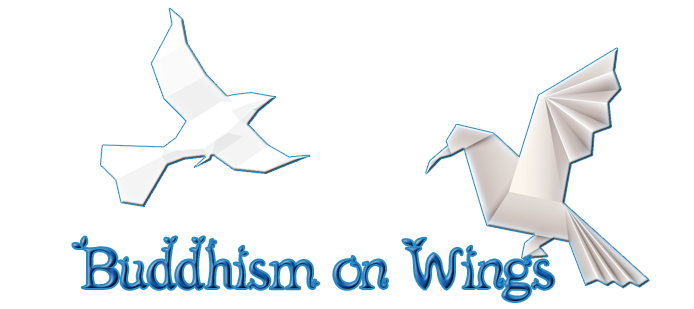|
|

or
How I Became Kinda Buddhist
Once upon a time, many ages ago when I was in my thirties, I was walking back to my office in San Diego on a blustery spring day. Stray scraps of paper were leaping and dancing in the gusty wind. It was a game to grab them as they passed by and then tuck them neatly in the next trash can. In the distance, one, about a half of a page, lifted lightly into the air. Something about it caught me — it swooped so low and twirled so high and with such lithesome grace, never quite touching the ground or the buildings. As I continued walking, I watched it, hoping it would come close enough to catch. Its wild gyrations carried it up almost to the roof level of two-story buildings before spiraling down — and rising again. It pirouetted at roof height right across the street before diving down and back the way it had come. With a sudden reverse, it swerved toward me... and gently settled against my chest.
I stood there, stunned, for a moment as it nestled there, held close by the breeze, until I reached slowly up and peeled it carefully from my breast. The first side was blank. The other side had been written on in hard pencil, not easy to read as it flapped gently in my hand. I smoothed it against a handy wall and held it there. It was a simple list of eight concepts, each with a few words of explanation after it. They were Right View, Right Intention, Right Speech, Right Action, Right Livelihood, Right Effort, Right Mindfulness, and Right Concentration.
I remember that the first was "Right View. To see things as they really are. To see the true nature of all things." I don't remember the exact wording of the others, but as I read down through the list, I became quite excited. Here, concise and clear, was a description of the path I'd been trying to follow in my own fumbling way. It was like hearing a huge bell ring, the kind that makes your bones vibrate. For several minutes, I just stood there on the street, reverberating. Carefully, I rolled the paper and carried it to my office where I sat and just looked at it until it was almost time for the next client. I can't say I was thinking or reading — just there, gently humming like a Tibetan bowl being rung.
My office consisted of three main rooms — the front, public room where I taught classes and met individual clients for counseling, the middle room for healing and massage, and the private back room for paperwork and writing. I took the page to the back room and pinned it to the wall above my desk so I only needed to raise my eyes to see it.
Gradually, it became a habit to look at it whenever there was an important decision to make. The checklist helped me keep on track more easily. Then it seemed obvious to begin applying it more widely. Did what I wrote, the classes I prepared, my actions and reactions concerning clients and students measure up to those standards? One of the first things learned (from a Sufi) was that "right" in this context meant "most appropriate, most loving, most healing." It was a constant challenge, and I fell by the wayside a lot.
About a half a year or so later, a fellow teacher, Rev. Warren A. Wise was in the back room as we checked through some class plans. He saw the half-sheet and said, "Oh, I didn't know you were into Buddhism."
I didn't know that either and told him so. He said, "But that's the eightfold path, the core of Buddhism."
I looked at it and shrugged. "I found this list and use it for a checklist for stuff. It's what I'm trying to do. I didn't realize it was Buddhist." Though I loved and trusted the man, I didn't feel like telling him about the paper whirling through the air and plastering itself to my heart. If that happened now, I'd think that Faery brought it to me, the spirits of the wind and air, perhaps, and would probably say so, but I was more shy about these things back then.
"I'll bring you a book about Buddhism. You'll like it."
He did, and I did, and it was the first of a number of books I've read on Buddhism, mostly Zen, but also other branches growing from the root of the Buddha's teachings. And I've also gone to a number of classes and meetings to try to learn more. Buddhism is vast. But I wouldn't call myself a Buddhist. If asked and if I have to come up with a "religion" I usually say "Zen Pagan" and leave it at that.
As far as my current practice goes, I'm human and often mess up. I'm still not perfect at those eight simple guidelines. What is "perfection" anyway? The word itself may be a kind of a trap. Eight little guidelines for living and loving, for compassion and healthy relationships with self and universe. Just eight. Amazingly difficult. Subtle, too. They sound so straightforward — and they are, but things have a tendency to complicate in human minds. We seem to have to start from simplicity, go through a great deal of complexity until our understanding expands enough to move on to a higher level of simplicity. It seems like all these lessons are quite simple once we truly get them. And it also seems that once we truly get them, a little time passes and they start complicating again... because there is yet another level to reach that we couldn't see before we got to this one.
Somewhere along my rather vagabond way through life, the original piece of paper disappeared. I've read a lot since then, and applied what felt appropriate. I made and still make mistakes; hopefully, I learn from them. Things are still checked by the "right guidelines" when there is doubt. You'd be astonished at how much time I spend on some of my responses on Facebook as I work through these. Some responses take days to get past the immediate reaction and into a space of reasonable clarity and "rightness" — as best I understand it.
There may be an end to developing wisdom, but I don't know if humans ever find it or if we have to progress far beyond the limits of the human mind before we get there. In fact, it may be that the consciousness of the entire universe isn't there yet. I wonder what would happen if the One became fully enlightened — reaching some state we can't even begin to imagine. What would that do to us, the tiny cells in Its being? Or does enlightenment work the other way and we small cells have to each and every one reach that ultimate Beingness before the One can?
Meanwhile, I'm still working on trying to find the heart of simplicity in the seeming tangle of complexity. We learn interesting things that way. And I watch carefully what the wind brings me.

Copyright ©2013 by Jessica Macbeth. All rights reserved.

Back to Biography
What's New?

Beannachd!
Jessica Macbeth
|
|

